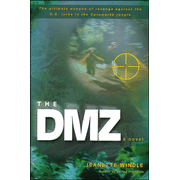 Journalist Julie Baker was born in a sleepy town in the remote Columbian jungle, the only child of a missionary couple who spend their lives, literally, to serve the local people. Julie plays with the local kids, learns to chatter away in Spanish and a tribal language, learns to climb jungle trees and hunt for toads hidden in the mud of the riverbank. Then, while she’s away at boarding school, the guerillas come in, there’s a cholera epidemic, her parents give away all the available medicine before succumbing to the disease themselves, and Julie is left alone. She firmly closes the door on her Columbian past, squelches any emotion but anger, and focuses on her future.
Journalist Julie Baker was born in a sleepy town in the remote Columbian jungle, the only child of a missionary couple who spend their lives, literally, to serve the local people. Julie plays with the local kids, learns to chatter away in Spanish and a tribal language, learns to climb jungle trees and hunt for toads hidden in the mud of the riverbank. Then, while she’s away at boarding school, the guerillas come in, there’s a cholera epidemic, her parents give away all the available medicine before succumbing to the disease themselves, and Julie is left alone. She firmly closes the door on her Columbian past, squelches any emotion but anger, and focuses on her future.
Now, years later, she has a chance to return to the area to cover a story for an environmentalist magazine she’s working for. But first the stage has been set with a lot of elaborate detail. Jeannette Windle is known for her intense research into heavy weaponry and terrorism and spy networks, and she lays on the suspense with a heavy hand.
The DMZ is a fun book to read. The first 100 pages or so set the mood, with various high-level US military commanders setting their lips grimly and mysterious weapons causing mysterious explosions in the jungle. Things pick up even more once spunky Julie Baker has slipped off the guerilla-maintained compound to visit her old home under cover of night. But hidden eyes are always watching her. Naturally enough, she ends up captured and kept in a hidden jungle camp, guarded by a young man she recognizes as one of her childhood friend’s little brother. The parts where her childhood knowledge saves her life, as she knows what plants are edible and how to catch and cook piranha and turtles and other wildlife, are some of the most enjoyable.
Windle grapples with the whole idea of how a loving God can allow terrible things to happen to his followers. What is meant by sacrifice? Can it be worth it to sacrifice one’s life for something greater? She realistically portrays the guerrilla fighters, recognizing their motivations and even their humanity as well as their terrifying predilection towards violence. She compares the cost they are willing to pay to the cost paid by Julie Baker’s parents. It’s thought-compelling and entertaining at the same time.
Elizabeth enjoys books like this that deal with hard issues without minimizing or cheapening them. Read more of her thoughts at her blog Planet Nomad.